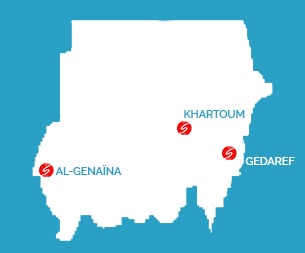Sudan: a typical case of humanitarian speaking out
As humanitarian aid workers, we are witnesses to the most heinous, the most massive, and often the most political violence. But we do not take part in hostilities, we do not choose sides: we bring humanitarian aid to people. We are bound by a pact of neutrality and impartiality with beneficiaries, donors and our teams. These founding principles guarantee our ability to help all populations without discrimination based on their needs.
We also have a duty to bear witness. This duty is written in article 8 of our NGO charter: “In its capacity as witness to the difficult conditions in which it operates, SOLIDARITÉS INTERNATIONAL strives to inform public opinion and if necessary to call public attention to the facts”. But bearing witness without subjectivity, without taking sides, can be complicated. Other professions have the role of denouncing these situations or taking political action. That’s not ours. We must be sincere in what we say, but we also must consider the reality that armed groups or states can deny us access to populations really easily.
In this situation, how can we speak out about the atrocities without losing our ability to deliver aid to the people? In Sudan, as in so many other countries, we had to reflect on our commitments and forge our position.
By Justine Muzik Piquemal
Sudan
Context and action- 43 million inhabitants
- 172nd out of 191 countries on the Human Development Index
- 21.000 people helped
One year ago, on 15 April 2023, when Sudan awoke to war, the situation was unreadable. We have to deal with the most urgent, following hour by hour, minute by minute, the information emanating from our colleagues on the ground and from social networks. Then the network stops working. The information we receive is sporadic. The violence of the fighting is indescribable and does not spare civilians. Our Sudanese colleagues, victims and direct witnesses of the atrocities, are trying to save their families in indescribable chaos. Being far away at a time like this is unbearable. We start counting: the damage, the violence, the needs, the dead, the living. We try to understand, but the situation is too confusing. We are not able to bear witness at that moment.
Expatriate teams evacuated. The Sudanese teams took shelter. But we quickly realized that we had to gather our forces, send equipment and find a way to act. Because the needs of the population are immense, and they cannot wait. Because the presence of international NGOs, working with all the protagonists, can only be beneficial, putting people back at the center of discussions. Nobody understands how we can imagine working in such a dangerous and chaotic situation, but we are redoubling our efforts to negotiate the resumption of our actions and the return of our international teams. Until we manage to re-enter Sudan, we install our tents in Chad, in the small town of Adré on the Sudanese border, which receives Sudanese refugees every day. On June 16, 80,000 people arrived in Adré in 48 hours. 80,000 battered human beings. People as far as the eye could see. Women and children wounded, bullet-holed and mutilated, stranded in front of the hospital. The humanitarian situation is beyond comprehension. We are among the few people able to bear witness to what is happening in Adré at this time. To remain silent would be a fail to our duty. We describe what we have in front of us1. We talk about this distress and the humanitarian needs that arise from it. We do not talk about political disputes, governments or armed groups. Since the beginning of the conflict, the protagonists have been passing the buck on the reasons of this war. Why so violent, why so dirty? We are not in a position to analyze that. Our role is to help the people. And to do that, we need to be able to describe their situation.
That’s why, since our return to Sudan, we have been constantly reporting on the situation. We are fulfilling our duty to inform and describe the humanitarian situation as transparently as possible. At the same time, we assume our duty of neutrality and communicate in such a way that no one involved in the war can accuse us of bias. And we always stick to the truth. It’s a difficult balancing act, but one that guarantees we can reach the people affected by the conflict and help them.
We have never agreed on a version of history with any of the parties involved. But we have not committed ourselves to silence either. In the end, we have rarely been as present in the media (TF1, Reuters, BBC, LCI, CNN, Le Monde, Marianne, The Economist, L’Obs, France Inter, France Info, France Culture, RFI, France 24, La Croix, Europe 1, Le Parisien…) as we have been since the start of this war. We are committed to talking about the humanitarian situation and what the population needs. We work with everyone, whatever their ethnic group, and we talk to all the armed groups. Thanks to this clear and fair discourse and positioning, our neutrality is recognized, and we can be present and act in Sudan today with the utmost transparency.
Finally, after a year of this war, it seems to me that the question of whether to denounce or to stay has to be asked differently. Everyone must take their place in a more general chain of responsibility. Humanitarian NGOs must leave it to others to investigate crimes and prosecute their perpetrators. But this does not absolve them of their duty to bear witness. Putting human beings and their needs at the center of concerns, denouncing the consequences of conflicts on populations, is our direct responsibility. Not doing so would be a failure. We can, and must, bear witness and help without discrimination.

